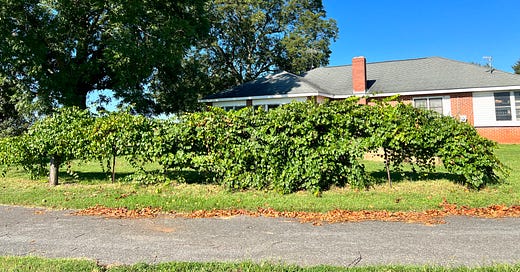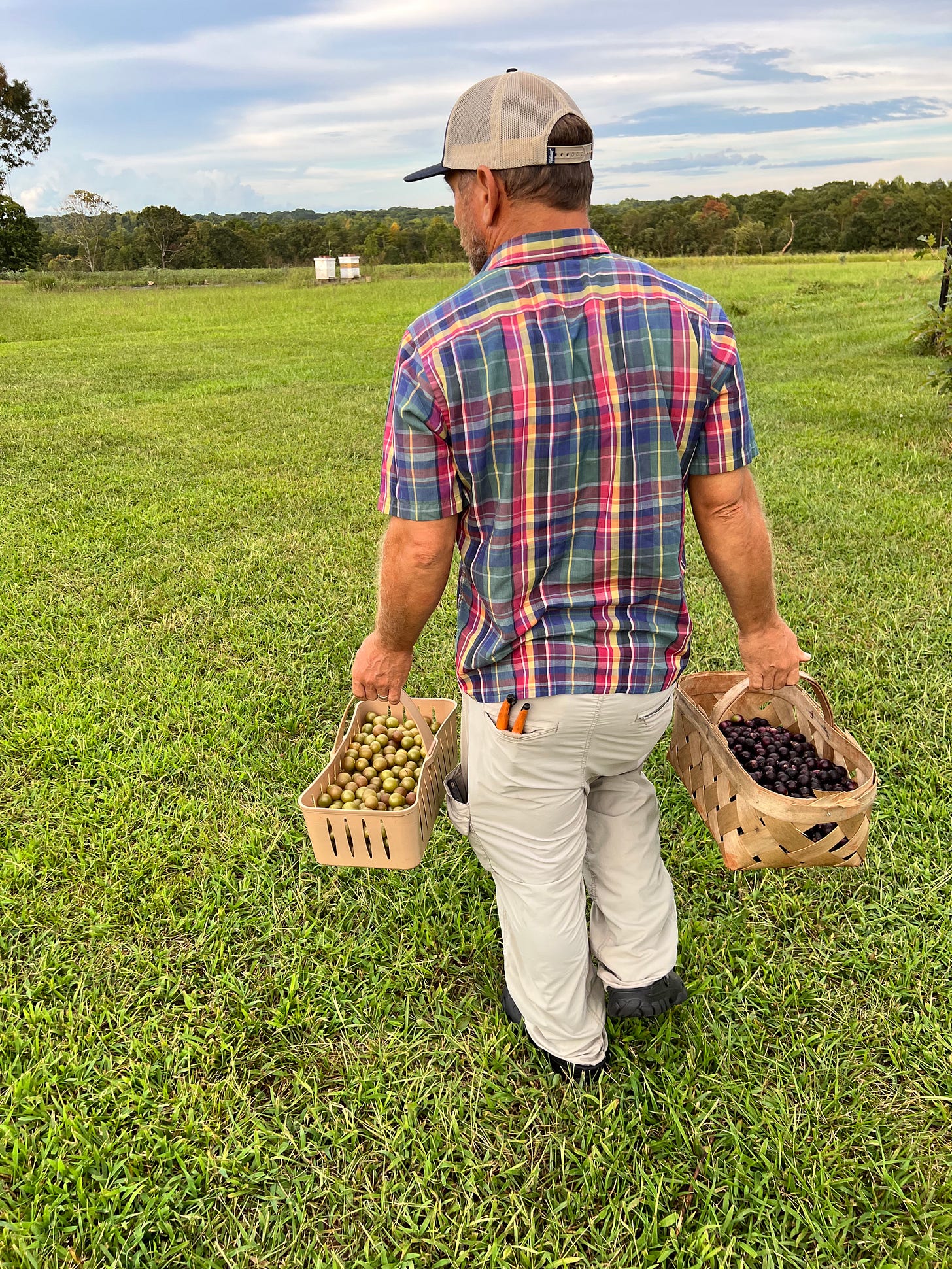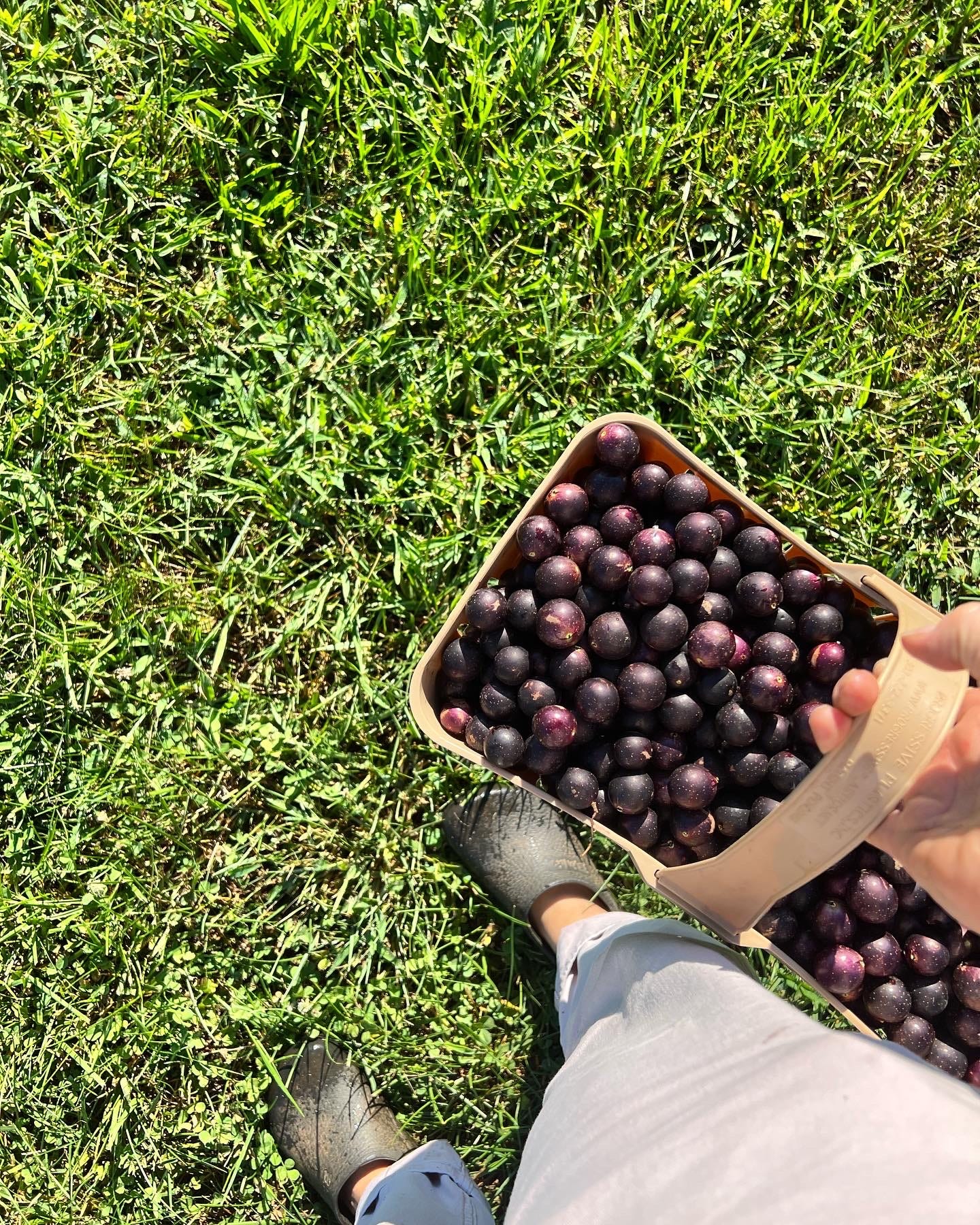Jamie plucks a scuppernong off the vine and tosses it into his mouth. I hear the snap-pop of the skin releasing its sweet wine juices and the crunch of the seed. My husband eats the seeds.
“Tastes like the fair,” he says with his mouth full.
It’s early September and the grape vines, golden scuppernongs and two varieties of purple muscadines, are putting on like they do every year. They sprawl elegantly across three trellised rows like the lithe arms of a dancer. Leaves cascade from their branches, a life-sized garland protecting the clusters of fruit beneath.
When the vines begin to fruit at the end of August, we know late summer has arrived. This means, too, that fall is imminent. We live by these timestamps. We’ve come to depend on them, actually. After the dreadful heat of August, the muscadine vines are a signal that change beckons. There is reassurance in these cycles of nature.
On this particular day, we’ve committed ourselves to an hour of picking. We had planned on a morning pick, but plans shifted as they often do on a farm. Despite what most people think, the day to day of farm living is less pastoral/cottage-core fantasy and more practical obligation. It is work. There is always something to be done, something that needs tending, a plant or person that needs prioritizing.
This week, it’s the muscadines. They’re ready whether we like it or not. The muscadines don’t hold off to suit our schedule. They do not follow up with a polite email to see what days and times work best for us.They could care less if time is scarce. When the grapes put on, they need picking or else they wither on the vine. This year, like most years, they are abundant, producing more than we can use.
I feel a sense of duty to the muscadines, and to Jamie’s grandfather who planted them twenty odd years ago. He’s no longer with us, but his presence looms large on the property and in the consciousness of his family. So much of our homeplace––the acreage, the grape vines, the fishing pond, and various outbuildings—is the result of his labor and investment. Sometimes I think it’s all preserved by his commanding bark that still echoes in the hallways of the mind. John Swofford had a very particular way of seeing the world, and you were either in agreement or a damn fool! I met a softer version of this man, but it was still an acquired taste.
I fill two baskets to the brim and vow to use every one of them, but still feel a sense of guilt for the ones left behind. Even with best intentions, some part of the harvest suffers. While we tended the muscadines, a basket of greasy beans that needed stringing languished. The fruit flies beat us to the last of the sungold tomatoes. Our bee hives desperately need an inspection. But there are mason jars full of watermelon rind pickles and candied jalapeños lining the counter, bits and pieces of the season captured; a mix of failure and success. Such is life.
The thing about living so close to nature’s cycles is that we are invested in them. We pruned the muscadine vines in early February, cutting them all the way back until it looked as though we might have gone too far (which is never the case). In the pallor of late winter, the gnarled stubs, ashen and bare, look as though life may never return. Yet every year, with our care and the sun’s warmth, the muscadine vines return with a constancy that shapes our world.
In the kitchen I squeeze the sturdy grapes between my fingers, releasing pulp from skin. Using both hands, I chip away at the basket, one by one, the pulp going into one container and the skins in another. The heady scent of muscadine grapes fills the air. Juice splashes up my elbow, and at least a few of the slippery insides catapult across the room. I have whittled my processing time down to one hour per basket.
Even after washing my hands, I’ll find sticky spots between my elbow crease and on my clavicle. Processing muscadines is a messy labor of love.
Once I separate the skins and pulp, I’ll buzz the skins in the food processor to tenderize and break them into smaller pieces. The pulp goes into a pot on the stovetop and is brought to a boil. As it heats, I use a potato masher to loosen the seeds from their center, periodically skimming the greenish foam from the pot. Once this boils I’ll strain the pulp, painstakingly pressing it through a sieve, gleaning every last bit until all that’s left in the sieve is a mess of seeds and the peskiest bits of pulp. This is my least favorite part of the process, but one of the most essential tasks. Once strained, I’ll recombine the buzzed up skins with the pale green pulp. I’ll use this to make muscadine-fig jam and handpie filling on the stovetop by adding sugar and spices. Jamie uses the skins to make muscadine vinegar. Time is of the essence here. Once processed, muscadines must be transformed.
On the farm, we save many types of seeds, but the muscadine seeds go into the compost.
Every year I offer the taste of muscadines to pie customers, most of whom decline to purchase the handpies, or the whole pie that riffs on the nostalgia of PB+J. Some folks don’t know muscadines, or the labor involved in producing a food item with them, and every year I am disappointed that more people don’t celebrate our state grape and revel in the short-lived season. Perhaps this is the farmer’s burden. We bear witness to the entire life cycle of plants and beings. We participate in the nurturing of these crops and celebrate their arrival after many months of tender care. Is this how parents feel when their kids are undervalued?
The people who know muscadines have bones-deep memories attached to them, stories as familiar as the back of their hands. Though I didn’t grow up with the muscadine, I have come to know these vines over the last eight years. I know the joys of picking the first fruits; how among the buzz of bumblebees and lazy sway of wasps, the sun peeks through a tangle of leaves and shines its golden light on a ripe cluster. I know the feeling of welcoming the grapes back, their royal pearlescence and spotted skins that seem to contain galaxies. I know that even in a focused fury of obligation, the beauty of the vines will give me pause and transmit an inalterable truth.
We are a part of nature, and nature is a part of us.







You write like no other I have experienced. Every experience you share is a lesson, an experience and a memory always appreciated, never forgotten. I love you and Jamie for your candid view and shared experiences. You allow us into your experiences, lessons and hearts and we are forever grateful for the knowledge we never knew we missed.
I could smell them as I read this! I definitely want a hand pie!